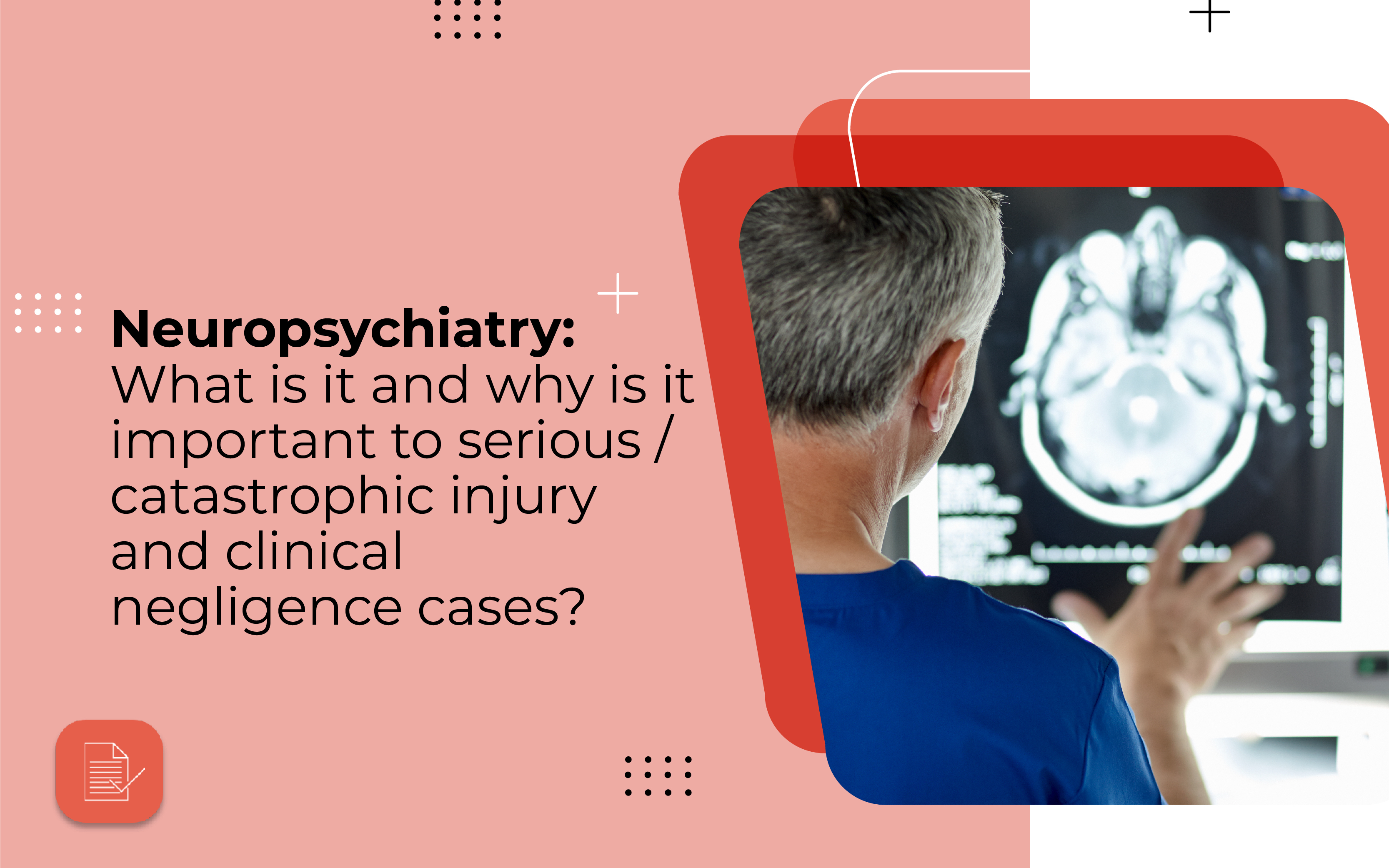
20 Mar 2023
Neuropsychiatry: What is it and why is it important to serious injury, catastrophic injury and clinical negligence cases?
Neuropsychiatry is an area of medicine that aims to understand the relationship between how disturbances in the brain can lead to certain behaviors or mental health conditions.
Neuropsychiatrists are medical doctors who have training in both neurology and psychiatry and can evaluate, diagnose and treat complex medical conditions that affect both the brain and a person’s behaviour and mental health.
The brain and how it affects our behavior
“The brain is a complex organ that controls thought, memory, emotion, touch, motor skills, vision, breathing, temperature, hunger and every process that regulates our body,” explains Johns Hopkins Medicine. Any disruption in the brain's delicate structure or function can lead to a wide range of neurological and psychiatric disorders, for example, people often suffer slurring of speech when they have a stroke or can develop mental health conditions such as anxiety and depression following a traumatic brain injury.
Neuropsychiatrists are specially trained to identify the underlying neurological causes of psychiatric disorders and to treat them using medication, psychotherapy, and behavioural therapy.
When would a neuropsychiatrist be required?
A neuropsychiatrist may be required in many situations including:
- Traumatic brain injury - People who suffer a traumatic brain injury may experience a range of physical, cognitive, and emotional symptoms. Neuropsychiatrists can help assess the impact of the injury on the brain and support them with appropriate treatment.
Stroke - A stroke causes damage to the brain and can affect someone’s physical and mental health. Neuropsychiatrists can help determine the extent of the damage and assess the impact the stroke has had on the patient. - Epilepsy - Epilepsy is a neurological disorder that can also affect a person's mental health. A Neuropsychiatrist can help diagnose and treat mental health issues associated with epilepsy, such as anxiety, depression, and PTSD.
- Movement disorders - Conditions like Parkinson's disease and Huntington's disease can cause movement disorders as well as cognitive issues. Neuropsychiatrists can work with patients with these types of conditions and help with any mental health issues that may have developed as a result of the disease.
- Dementia - The NHS describes dementia as “a syndrome (a group of related symptoms) associated with an ongoing decline of brain functioning. There are many different causes of dementia, and many different types.” Neuropsychiatrists can help diagnose various types of dementia and support patients and their families in managing the symptoms.
- Neurodevelopmental disorders such as autism and attention-deficit/hyperactivity disorder (ADHD) - These types of disorders can affect both cognitive function and behaviour and often require a neuropsychiatrist to offer support with ongoing treatment.
- Chronic pain - Chronic pain can affect a person's mental health and quality of life and may need a neuropsychiatrist to help with the cause of the chronic pain as well as associated mental health issues such as depression and anxiety.
Why are neuropsychiatrists so in demand in serious / catastrophic and clinical negligence cases?
Neuropsychiatrists are often in demand in serious / catastrophic and clinical negligence cases because they have specialised training and expertise in both neurology and psychiatry. Most cases that involve changes to brain function and mental health following potential serious / catastrophic and clinical negligence will require a neuropsychiatrist to help to establish the extent of any neurological and/or psychiatric damage that may have occurred.
Neuropsychiatrists can evaluate the complex relationship between neurological and psychiatric symptoms and can provide insight into the potential causes and consequences of any injuries or harm that may have resulted from medical treatment. They can also help to assess any changes on the patient's quality of life following any clinical negligence that may have occurred.
A neuropsychiatrist’s expertise are especially valuable in cases involving brain injuries, neurodegenerative disorders, or other conditions that involve both neurological and psychiatric functioning.
How Speed Medical can help support your case
Whether you require a GP or consultant screening report, a causation or breach of duty report, a condition and prognosis report, or a medical assessment, our nationwide panel of experts can help support your clinical negligence case. We have over 2500 experts including an extensive list of highly qualified neuropsychiatrists who can work with you and your client on your case.
For our full list of services and for more information or our panel of experts, visit our site or get in touch with our friendly team today.






